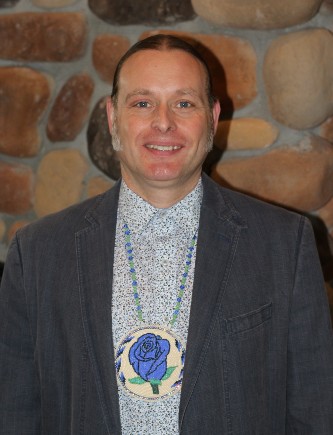Indigenous health expert Sean M. Daley, a professor of anthropology at Johnson County Community College in Overland, Kansas, and founder and director of its Center for American Indian Studies, will join Lehigh’s College of Health on Aug. 1.
Indigenous Health Expert Sean M. Daley Joins the College of Health
Daley has worked with American Indians since 1995 in Arizona, Connecticut, Kansas, Montana, New Mexico, South Dakota, and other other states.

Sean M. Daley
At Lehigh’s College of Health, Daley will serve as the co-director of a new Institute for Indigenous Studies (IIS), whose mission is to improve the physical, mental, spiritual and cultural health of Indigenous communities and individuals in the United States and abroad.
“I am delighted to welcome Professor Sean Daley to the university and the faculty of the College of Health,” said Whitney Witt, inaugural dean of Lehigh’s College of Health. “As a scholar, Dr. Daley is a leading national expert on Indigenous health. His upcoming research will examine the epidemic of violence and mortality among Indigenous women and girls.
“Not only is Dr. Daley an independent scholar with a robust and innovative program of research,” she said, “but he is also an amazing teacher, mentor and advisor.”
Daley, who uses culturally tailored, community-based participatory research methods, has conducted multiple ethnographic studies with American Indian communities that focuses on health and wellness, law and policy, identity, education and the environment.
He holds a Ph.D. in sociocultural anthropology from the University of Connecticut, a master’s degree in American Indian Studies from the University of Arizona, and a bachelor’s degree in American Indian studies and anthropology from Livingston College at Rutgers University.
His early interest in American Indian culture centered on religion and spirituality, but Daley said he learned very quickly through his anthropology studies that “once you get outside the Western model of health and religion, particularly in indigenous cultures, there is no difference between health and religion. They are the same thing.”
To better understand the religious traditions that interested him, Daley said he had to learn more about indigenous groups’ perceptions of health and wellness. “[Health and religion] got more and more connected in my mind,” he said. “So for me to work in the area of religion is to work in the area of health, and vice versa.”
One area of Daley’s research centers on reducing tobacco use among American Indians, who have the highest prevalence of cigarette smoking among any racial and ethnic group in the United States. The research is critical, as tobacco use can contribute to heart disease and other health matters. His work with the smoking cessation program All Nations Breath of Life recognizes that many Native people consider tobacco to be a sacred plant. The program promotes honoring tobacco and not abusing it recreationally.
Daley’s other research interests include American Indian religions and world views, American Indians and higher education, American Indian federal laws and policies, contemporary American Indian tribal life and contemporary American Indian tribal governance.
His work with Native youth has aimed to help them to finish high school and go on to college and graduate school. He said Native youth face obstacles to higher education that differ from what non-Native youth face, including cultural as well as socio-economic pressures that non-Native professors might not understand.
Additionally, through funding from the National Endowment for Humanities, Daley helped to train 11 faculty members across departments at Johnson County Community College in how to incorporate contemporary American Indian issues into their curricula. He has helped facilitate seminars with American Indian scholars and community activists from across the country.
“One of the issues we have is that people are still teaching about American Indians as if they're in the 1880s,” Daley said. “The reality is, there are millions of American Indians today all over the United States living very contemporary lives.”
Daley helps to run an anthropology/public health internship program for high school, college and graduate students that promotes better understanding of Native American populations. Through the program, students are exposed to research with Native communities, both on reservations and in urban areas. He hopes to continue the program at Lehigh.
Daley said he also looks forward to joining the faculty at the College of Health and broadening his work to include other communities and indigenous groups throughout the world. He plans to rigorously pursue his research into the epidemic of missing and murdered Indigenous women and girls, an issue that has received little to no attention outside of Indian communities.
Daley said he was drawn to Lehigh because of its strong reputation as a leading research institution, as well as for the opportunity to build new programs and partnerships in the College of Health. Said Daley: “The idea of being part of an inaugural faculty and building something from scratch, or from the very early stages at least, is incredibly appealing.”




